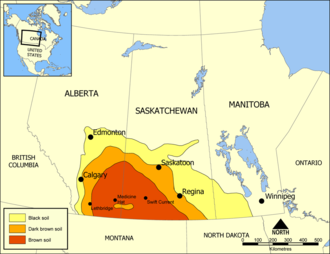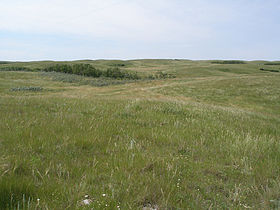
The Missouri Coteau, or Missouri Plateau, (French: Coteau du Missouri) is a large plateau that stretches along the eastern side of the valley of the Missouri River in central North Dakota and north-central South Dakota in the United States.[1][2] In the Canadian provinces of Saskatchewan and Alberta this physiographic region is classified as the Uplands Missouri Coteau, which is a part of the Great Plains Province or Alberta Plateau Region, which extends across the southwest corner of the province of Saskatchewan as well as the southeast corner of the province of Alberta.[3] Historically, in Canada the area was known as the Palliser's Triangle and regarded as an extension of the Great American Desert and unsuitable for agriculture and thus designated by Canadian geographer and explorer John Palliser. The terrain of the Missouri Coteau features low hummocky, undulating, rolling hills, potholes, and grasslands.[4] Apart from being a geographical area, the Missouri Coteau also has a cultural connection to the people of the area, the Métis people of South Dakota, along with other Indigenous groups.[5] The history of this plateau is large, and the Missouri Coteau has a significance to these people.[6]

- ^ Shjeflo, Jelmer B. "Evapotranspiration and the Water Budget of Prairie Potholes in North Dakota". Archived from the original on 2012-04-26. Retrieved 2012-12-24.
- ^ John C. Hudson (8 February 2002). Across This Land: A Regional Geography of the United States and Canada. JHU Press. pp. 296–. ISBN 978-0-8018-6567-1.
- ^ Penner, Lynden, "Missouri Coteau", The Encyclopedia of The Great Plains, retrieved 2007-05-16
- ^ Richards, J.H.; Fung, K.I. (1969), Atlas of Saskatchewan, University of Saskatchewan: Modern Press
- ^ Lass, William (1965). "The Fur Trade on the Upper Missouri". Business History Review (Pre-1986). 3. Retrieved 21 November 2019.
- ^ Lass, William (1965). "The Fur Trade on the Upper Missouri". Business History Review (Pre-1986). 3. Retrieved 21 November 2019.